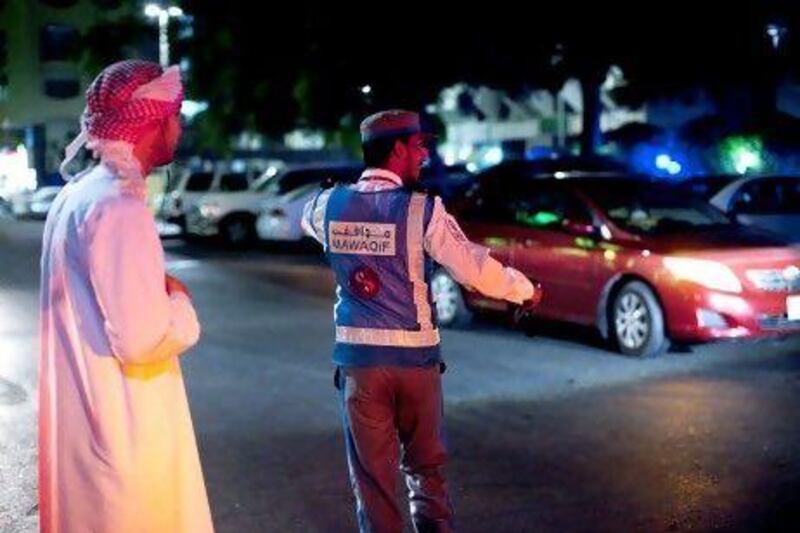ABU DHABI // Mawaqif parking inspectors are speaking the language of compassion this Ramadan, forgiving many of the motorists who were unaware of changed paid-parking times.
Violations have tripled since the start of the Holy Month, when paid parking times changed to 9am-4pm, and 10.30pm-2.30am. Paid parking is normally from 8am-10pm except on Fridays and holidays.
But signs notifying motorists of the change are few and far between, and many drivers remain unaware of the new hours.
Inspectors say they have been lenient in the first few days of Ramadan.
"I'm taking it easy because people don't know until now," says Mohammed, an inspector who did not give his full name. "The best thing we're doing until now is talking to people. I should advise you first then give you a ticket."
In the course of his shift, from 10pm-2.30am, he issues two tickets, but forgives the 30 offenders he sees after midnight.
"But I can fine more, honestly, maybe 30," he says. "But in Ramadan people don't know the time, that is why we try to give them some mercy."
Such leniency has its limits. Within a couple of weeks, motorists pushing the parking rules will not get off so lightly.
"We will start to check all the cars, because 90 per cent of people will know the rules," says Mohammed.
Only one motorist interviewed by The National knew about the Ramadan Mawaqif timings.
At 11pm, parking was still hard to find in Al Markaziya, near the Corniche. Outside one block of flats, three cars stood idling, waiting for a space to come free.
"I do this every night," says Mohammed Rajeb, 29, an Egyptian who waited 20 minutes for a space. "In Ramadan, parking's no better and no different."
Waiting behind him was Ahmed Nofall, 26, who was anxious but expressed gratitude for the extended hours, which allowed a late-night visit to his sister at an hour when parking is normally reserved for residents only.
"It's so bad," says the Syrian. "Maybe I should have a party in my car?"
Parking spaces are scarce between 10pm and midnight during Ramadan because more people shop and work at their offices after late-night prayers, says another inspector, also Mohammed, working near the Corniche.
He issues most tickets after midnight, when many people wrongly think parking is free.
No signs in the area show the amended parking times for the Holy Month.
"Yesterday someone cried," Mohammed says. "He wanted me not to ticket him but I gave it already. He wanted me to take it back."
After midnight, when the tailors and grocery stores have closed, the pressure on spaces eases. But this is the hour when Mawaqif inspectors must be most vigilant.
After a day of rest and prayer, motorists head for cafes, idling their cars outside them in the mistaken belief that the inspectors have gone home for the night. It is a frenzy that Kabir Aleem knows all too well. He valets for a hotel beside a KFC fast-food outlet that does a brisk trade after iftar.
At 1.30am, he had been looking for a parking spot for half an hour.
"Normally after 10 o'clock I can get parking," he says. "But in Ramadan I'm rounding, rounding."
Around the corner, a young man leaves his Toyota Corolla idling, hazard lights flashing, in front of a shisha cafe, blocking five vehicles.
"Ya, ya, ya, I smoke only shisha and go," he says, as he entered the cafe.
Watching from under a tree, Yagoub Ibrahim lets out a heavy sigh. Mr Ibrahim, from Sudan, knows the secret to making the inner calm of Ramadan last all year round.
At one time, he used to spend thousands a year on fines - and an hour every day hunting for a parking space. Now, he saves money and stress - he has given up his car.
"Bus is better, wallah," he says. "It goes slowly but it's better.
@ For more on RAMADAN, visit thenational.ae/topics






